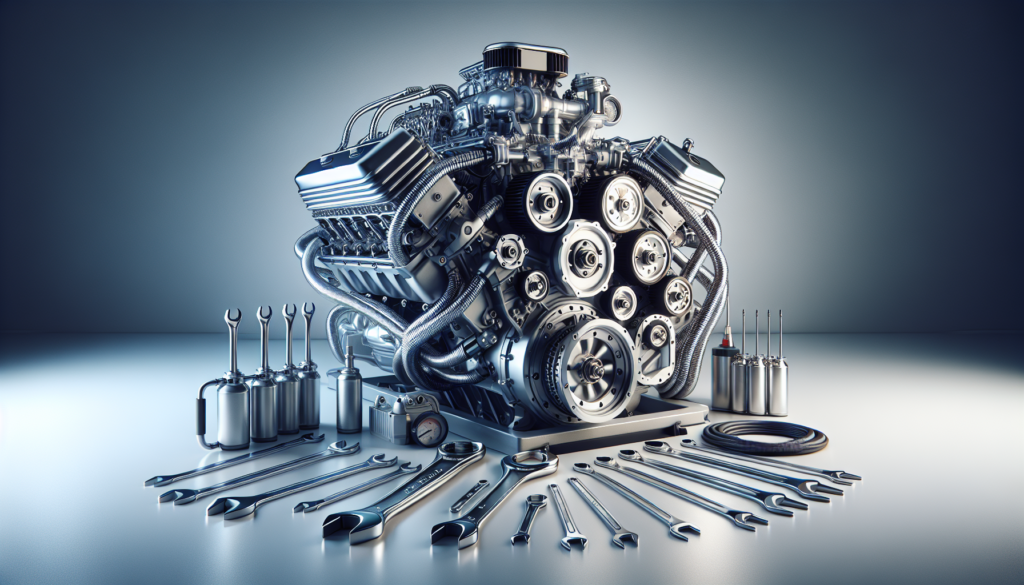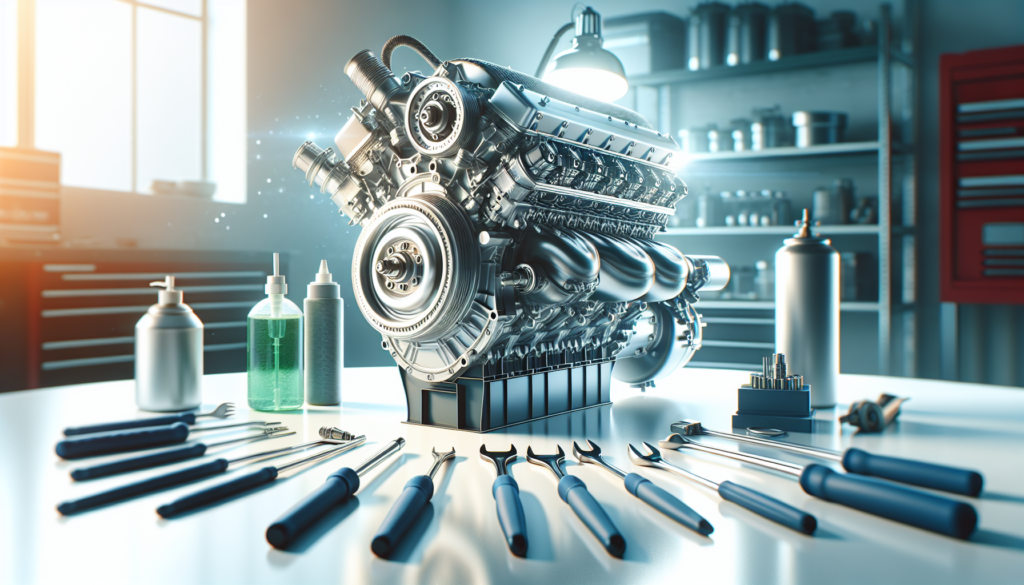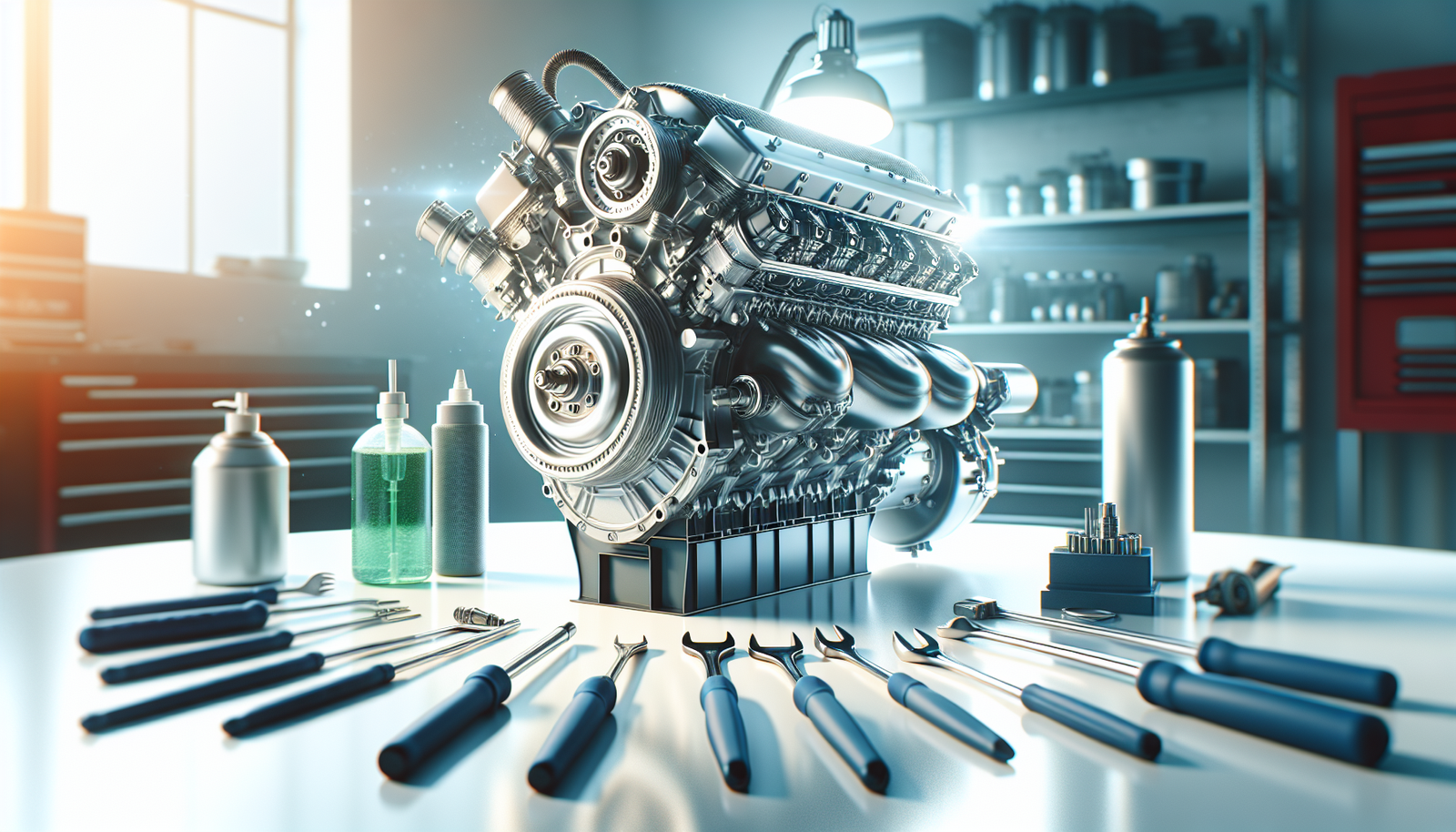Embarking on a seafaring adventure or merely relaxing by the pier can become tedious when your boat engine isn’t performing at its optimum level. “Maximizing The Performance of Your Boat Engine” is specifically tailored towards arming you with essential tips and valuable insights that enhance your boat engine’s performance. This comprehensive compilation includes easy-to-follow maintenance procedures, expert advice on fuel selection and efficient navigation techniques. You’ll soon find your boat engine humming better than ever, ensuring a seamless journey every time you hit the waters.

Understanding Your Boat Engine
Having a basic understanding of your boat engine is a useful and practical skill. While it may seem a bit complex on the surface, once you understand the structure and workings of the engine, you will be able to troubleshoot problems more efficiently. You will also gain knowledge of how to enhance your boat’s performance and make optimal engine-related decisions.
Components of a Boat Engine
Your boat engine is made of several key components, each performing a specific function. These include, but are not limited to, the cylinders, pistons, a crankshaft, valves and a cooling system. Knowledge of each of these components will enable you to have an insightful understanding of the overall functioning of your engine.
Difference between Boat Engines and Car Engines
Boat engines differ significantly from car engines in a few key aspects. For starters, boat engines run at maximum power for much longer periods than car engines, which generally operate at varying power levels. Secondly, water cools boat engines while car engines are typically cooled by air. Lastly, a boat engine usually powers a propulsion system directly, unlike a car engine that relies on a transmission.
How a Boat Engine Works
Just like any other engine, a boat engine operates on the basic principle of internal combustion to generate power. Air and fuel are mixed together in a combustion chamber. This mixture is ignited, creating a mini explosion that drives the moving parts of the engine, which in turn powers the boat.
Choosing the Right Engine for Your Boat
Selecting the correct engine for your boat is crucial. It can significantly impact the performance and fuel efficiency of your vessel. Factors such as boat size, type of usage, and your personal preferences come into play when making this decision.
Factors to Consider When Choosing a Boat Engine
When you’re choosing an engine, think about what you need in terms of power, speed, fuel economy, and reliability. It’s also important to consider your typical boating environment and conditions, as well as how often you plan to use your boat.
Boat Size and Engine Power
Boat size and weight largely dictate the necessary engine power. As a rule, larger and heavier boats require greater horsepower to achieve optimal performance. But keep in mind, more power often means increased fuel consumption.
Types of Boat Engines
There are various types of boat engines—chiefly, inboard, outboard, and sterndrive engines—each having its own sets of pros and cons. Outboard engines are often used for small to medium boats and are positioned on the exterior, while inboard engines are used for larger vessels and are situated inside the boat. A sterndrive engine, also known as an inboard/outboard engine, is a hybrid of the two.
Recommended Boat Engines
The engine you choose should be based on your personal preferences and needs. Some top recommendation for engines, based on their high-rated performance are Yamaha, Honda, and Mercury. Of course, it’s best to consult with an expert or a boat builder to ensure you select the right engine.
Proper Engine Maintenance
Much like any other machine, your boat engine requires regular maintenance to operate smoothly and extend its lifespan. Furthermore, preventative maintenance can help you avoid costly repairs and unexpected breakdowns.
Importance of Regular Maintenance
Regular maintenance is essential to preserve the health and efficiency of your engine. It ensures that your engine runs smoothly, uses fuel efficiently, and significantly reduces the risk of untimely breakdowns.
Checklist for Engine Maintenance
Common items on a boat engine maintenance checklist might include checking and changing the oil, inspecting and replacing spark plugs, checking and replacing fuel filters, and ensuring that the cooling system is functioning correctly. Other tasks may involve inspecting the propeller and cleaning and de-carbonizing your engine.
Recognizing Signs of Engine Trouble
At times, despite regular maintenance, your boat engine may demonstrate signs of trouble. These may include excessive smoke, unusual noises, loss of power, or high fuel consumption. Early detection of these signs can prevent more significant problems.
When to Seek Professional Help
While basic maintenance can be performed by any boat owner, there are times when seeking professional help is advisable. If you notice any severe anomalies or if your boat engine requires complex repairs, it’s best to turn to a professional mechanic.

Fuel Efficiency
Fuel efficiency is a critical aspect to consider for any boat owner, as it directly impacts your boating costs as well as the performance of your vessel. By understanding fuel consumption and choosing the right fuel for your boat, you can significantly improve the fuel efficiency.
Understanding Fuel Consumption
Fuel consumption is the amount of fuel your boat engine utilizes per hour of operation. It’s dependent on various factors, including engine size, boat weight, speed, and sea conditions. Having an understanding of this will allow you to manage your fuel use more effectively.
Choosing the Right Fuel
The type of fuel required depends on your boat engine. While most boat engines can run on regular unleaded gasoline, some high-performance engines require premium gasoline or diesel. Regularly using the correct type of fuel can enhance engine performance and longevity.
Improving Fuel Efficiency
There are several ways to improve fuel efficiency. These include maintaining optimal engine speed, keeping your boat’s hull clean and smooth, regularly servicing the engine and selecting the proper propeller. Fundamentally, an efficiently running engine consumes less fuel.
Propeller Selection and Maintenance
The role of the propeller in your boat’s performance is integral. The right propeller helps optimize engine performance and improves fuel efficiency. Simultaneously, regular maintenance ensures a propeller remains in its best working condition.
Understanding the Role of the Propeller
A propeller converts the engine’s power into forward movement by cutting through the water, much like a screw. The size, pitch, and number of blades on the propeller directly impact the boat’s speed, maneuverability, and fuel economy.
Choosing the Right Propeller
When choosing a propeller, you’ll have to consider your boat’s size and weight, the engine’s horsepower, and your desired performance levels. A propeller with a large diameter or more blades will provide more push, which is ideal for large, heavy boats. Alternatively, a prop with fewer blades and a small diameter is better for speed.
Maintaining Your Propeller
Regular maintenance of your propeller involves checking for any visible damage, ensuring a tight fit on the prop shaft, regular cleaning, and periodic checking of balance. Keep in mind that a damaged prop can cause inefficiency and can overwork your engine.
Engine Tuning and Adjustments
Engine tuning and adjustments are necessary when you need to optimize your boat’s performance. A well-tuned engine can lead to efficient fuel usage, improved boat speed, and an overall smooth ride.
Understanding Engine Tuning
Engine tuning involves adjusting the engine’s systems for optimal performance and fuel consumption. This may include adjusting fuel mixtures, ignition timing, and replacing worn-out parts.
How to Tune Your Boat Engine
Tuning your boat engine involves multiple steps. You might need to replace the spark plugs, adjust the carburetor, inspect and perhaps change the ignition coils, just to name a few. If you’re not familiar with engine mechanics, it may be best to have a professional perform the tuning.
Benefits of Engine Tuning
Proper engine tuning not only results in better overall performance, but it will also increase your engine’s longevity. With increased fuel efficiency, lower emission levels, and a more smooth ride, you can’t go wrong with keeping your engine well-tuned.
Optimizing Boat Speed and Performance
Enjoying a smooth, fast ride is often the goal of many boat owners. Understanding aspects such as drag and lift, and actively implementing measures to improve boat speed can have significant impacts on achieving optimal performance.
Understanding Drag and Lift
When your boat moves through the water, it experiences two primary forces: drag and lift. Drag is the resistance your boat encounters as it moves in the water, while lift is the upward force that keeps your boat planing on the water’s surface. Balancing these forces effectively leads to an optimal performance.
How to Improve Boat Speed
Improving boat speed is a process that involves a myriad of factors. These factors can range from having a powerful engine, choosing the right propeller, reducing boat weight, and adopting a streamlined design. Regular engine maintenance also plays a crucial role in enhancing speed.
Achieving Optimal Performance
Achieving optimal performance is a blend of maintaining a well-tuned engine, reducing drag, enhancing lift, and ensuring proper weight distribution in the boat. Other factors include selecting the appropriate propeller and embracing regular preventative maintenance.
Electrical Systems and Engine Performance
The effectiveness of your boat’s electrical system is critical for optimal engine performance. Proper maintenance and timely troubleshooting of issues can ensure a seamless power supply, enabling your engine to run efficiently.
Role of Electrical Systems in Engine Performance
Your boat’s electrical system acts as the lifeline for your engine. It powers the ignition, fuel systems, alternators, and other critical components, ensuring optimal engine performance.
Maintaining the Electrical System
Maintaining the electrical system involves regularly checking the battery, examining switches and connectors, inspecting wires for corrosion or damage, and ensuring that alternators and regulators are working correctly.
Troubleshooting Electrical Issues
When faced with electrical issues, like frequent dead batteries or dim lights, it’s essential to troubleshoot quickly. Check and clean battery terminals, inspect the wiring, and make sure all the connections are tight and corrosion-free. Issues persisting after preliminary checks should be handled by a professional.
Overcoming Common Engine Problems
Boat engine problems, if detected early and managed appropriately, can be resolved quickly. Being aware of common engine issues and adopting measures to prevent them, can save you both time and money.
Common Boat Engine Problems
Common boat engine problems include overheating, loss of power, excessive smoke, sudden and unusual noises, high fuel consumption, and oil leakage. By keeping a watchful eye and engaging in regular maintenance, you can prevent most of these issues.
Troubleshooting Engine Problems
If your engine starts behaving unusually, it’s crucial to troubleshoot immediately. Check for any visible anomalies like leaks or cracks. Listen for any abnormal sounds, and sense any unusual vibrations. It’s equally important to check your instruments for any warning signs.
Preventing Engine Problems
The best way to prevent engine problems is through regular maintenance. Routinely checking and servicing your engine, using the right fuel, adopting proper engine tuning, and using quality parts during replacements can significantly reduce the chances of a breakdown.
Schedules and Records for Engine Care
Meticulously maintaining schedules and records for your engine care can significantly help in effectively managing your engine over the course of your boat’s lifespan. It can aid in preventing unexpected breakdowns, ensuring regular maintenance, and tracking performance.
Importance of Keeping Records
Keeping records of your boat maintenance helps you track the health of the engine over time, schedule regular maintenance, and easily diagnose problems when they arise.
Creating a Regular Maintenance Schedule
A regular maintenance schedule ensures important tasks are not missed. The schedule should typically include daily, monthly, and seasonal tasks. This schedule might include items like checking the oil level, inspecting the propeller, monitoring engine performance, and full tune-up checks at regular intervals.
Keeping Track of Engine Performance
Keeping a log of your boat’s performance, such as speed, fuel efficiency, and engine smoothness, can help you quickly identify any deviations that could signal potential problems. With this, you can nip the issue in the bud before it turns into a significant problem.
In conclusion, understanding your boat’s engine, choosing the right made-to-measure engine, and keeping up with regular maintenance routines directly contribute to your boat’s performance and longevity. Simultaneously, understanding elements such as fuel efficiency, the role of the propeller, engine tuning, and electrical systems can significantly enhance your overall boating experience.

